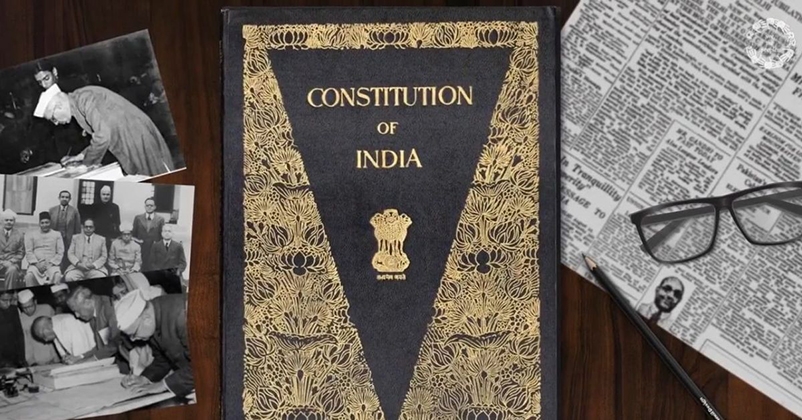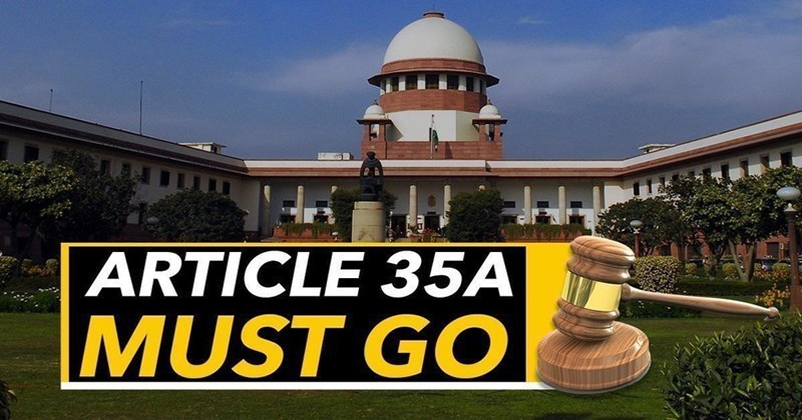Article 35A is against the spirit of Indian constitution and also ignores the will of Maharaja Hari Singh
| 06-May-2019 |

India is one of the largest democracies. Since independence, India has cherished the dream of ensuring the participation of people and for that purpose monarchy was removed and the concept of popular support was inserted. The constitution of India was drafted with the intent that the discrimination must be removed in all its manifestations. Even the accession of the princely was having the basic objective of abolishing monarchy and giving the power to the people. According to one estimate there were 562 princely state that covered around 45 % of the land mass of the undivided India and out of which Jammu and Kashmir was one such princely state. This state was ruled by Dogra ruler Maharaja Hari Singh during 1947, when India attained independence. Maharaja paved the way for democracy and acceded to India instead of Pakistan. He was the firm believer of democracy; whose he seeds he had sown in 1934 when he endorsed the formation of a Legislative Assembly in Jammu and Kashmir, which he called Praja Sabha. The abdication of monarchy and accession to secular India was just another step in this regard. But his all supreme sacrifices were ignored by Delhi. Unfortunately, Nehru did not look beyond selective personalities in Kashmir and ensured that democracy should not flourish in J&K. Though all the symbols, which represent Maharaj Hari Singh, were demolished yet the draconian and unconstitutional provision, in the form of Article 35A, was inserted in the Constitution of India.
Sheikh Abdullah protest for establishing democracy though Maharaja was more democratic
In 1946, Nehru was arrested by Maharaja Hari Singh because Nehru visited the state to show his solidarity with Sheikh, who was running a malicious campaign against Maharaja. Perhaps, this arrest played more havoc and Nehru got closer to Sheikh Abdallah and ignored Maharaj Hair Singh. His anguish against Maharaja could gauged from the fact that he first ensured the release of Sheikh Abdullah from prison and later pressurized Maharaja Hari Singh to install Sheikh Abdullah as an emergency administrator. Nehru force Maharaja give the rein of the state into Sheikh’s hands. Subsequently, the central government, under Nehru’s Prime Ministership, remained oblivious to the atrocities of Sheikh Abdullah and even became the culprit of the crime of strangulating democracy in Jammu and Kashmir. Nehru being considered a man of sternly anti-feudal and anti-monarchist convictions took a special interest in Kashmir and his personal grudges with Maharaja Hari ensured that he fall prey to the malicious campaign of Sheikh Abdullah against the ruler of the state.
The rise of Sheikh Abdullah in the politics of Jammu and Kashmir can be traced to his panchance to establish democracy and removal of autocracy in the state yet it was no hidden truth that his actual intention was different. He was more interested in grabbing the power in the state instead of establishing democracy. The indication of his cunningness could be found in the manner he proceeded and created a mayhem in J&K. Though he changed the name of his political outfit from All–Jammu and Kashmir Muslim Conference (MC) to All–Jammu and Kashmir National Conference (NC) to show that he is secular yet his party’s Muslim orientation was inevitable. Even his ‘Naya Kashmir’ manifesto was written in Urdu language, which was not used by all the community in J&K. Even in 1944 NC was snubbed by Muslim League’s leader, Mohammed Ali Jinnah, who said Muslim Conference (MC) as the sole representative organization of 99 percent of J&K Muslims though Sheikh vied to get into good books of Jinnah. Therefore, Sheikh’s inclination towards Nehru increased only to get the realm of the J&K. Later, when the fighting between India and Pakistan was ceased, Sheikh was remained in power and his anti-Hindu stance came to the fore. On July 13, 1950 Sheikh introduced land reforms, according to which the lands were usurped in J&K by his government without paying even a single rupee to the landlords, who were mainly Hindus. Understanding the imminent danger to the democracy in J&K, the pro-democracy supporters got united and formed Praja Parishad in 1947. On May 1, 1951 the Prince Regent Karan Singh issued a proclamation announcing the elections for the Constituent Assembly on the basis of adult franchise by secret ballot. The elections took place in September–October 1951. The Praja Parishad decided to contest election for Constituent Assembly. Their candidates were to contest on 28 seats but 13 of its members were disqualified arbitrarily. Therefore, it did not contest Constituent Assembly elections in protest. Also, all these years NC slogan was “One Leader, One Party, One Programme”—meaning Abdullah, the National Conference, and the 1944 Naya Kashmir agenda whereas Praja Parishad slogan was Ek Vidhan, Ek Nishan, Ek Pradhan (one constitution, one flag, one premier) for all of India—a direct attack on Abdullah’s “prime minister” title, on the adoption in late 1949 of the NC’s party flag as the J&K state flag. Surprisingly, the leadership in Delhi kept its eyes closed. Above all, the mandate of constitution-making of J&K was given only the NC candidates and opposition was eliminated arbitrarily.

Karan Singh’s proclamation of November 25, 1949 that does not mention about any special provision
On November 25, 1949, Dr Karan Singh, Yuvraj of Jammu and Kashmir, issued a proclamation for the State of Jammu and Kashmir that inter-alia stated that the Constitution of India shortly to be adopted by the Constituent Assembly of India shall govern the constitution relationship between J&K and India. He also added that the said Constitution shall, as from the date of its commencement, supersede and abrogate all other constitutional provisions inconsistent therewith which are at present in force in this state. This proclamation clearly allowed the extension of all the provision of Constitution of India even before the provisions of Constitution of India came into force yet Nehru ignored it only to satisfy his personal ego vis-à-vis Maharaja of Jammu and Kashmir. The important point in this proclamation was that it allowed Government of India to implement the Constitution of India in J&K in its entirety and these was no mentioning of any different treatment of resident of J&K and the residents of other parts of the country.
Constitution of India
We, the people of India, having solemnly resolved to constitute India into a _1[Sovereign Socialist Secular Democratic Republic] and to secure to all its citizens:
JUSTICE, social, economic and political;
LIBERTY of thought, expression, belief, faith and worship;
EQUALITY of status and of opportunity;and to promote among them all
FRATERNITY assuring the dignity of the individual and the _2[unity and integrity of the Nation];
IN OUR CONSTITUENT ASSEMBLY this twenty-sixth day of November, 1949, do HEREBY ADOPT, ENACT AND GIVE TO OURSELVES THIS CONSTITUTION. Yet the then Congress government forgot this constitutional mandate in case of J&K and inserted a provision in the Constitution of India clandestinely that allowed J&K Government even to violate fundamental rights in the state.
Insertion of Article 35A was a constitutional fraud
Article 35A was a constitutional fraud. Article 35A is that part of the Constitution of India which was added by the President of India without getting it discussed and approved from the Parliament of India. Though many of the proponents of Article 35A state that the President of India has used the power conferred on him under Article 370 of the Constitution of India yet it gives power to him to implement only those provisions of the constitution, which have already been available in the Constitution. Article 35A is the addition of a provision in the Constitution that requires amendment in the constitution and amending power rests with the Parliament of India under Article 368 of the Constitution. The basic difference in monarchy and democracy is that the decisions are taken by ruler alone in case of former whereas the decision are taken collectively in the case of the latter. India being a democracy did not create a monarch since its independence. Further, the constitutional amendment has not taken place for the purpose of adding this provision, as the addition of this provision is not available in the list of constitutional amendment list. The provision is also not found even between Article 35 and Article 36 or anywhere in the Constitution except appendix.
Article 35A sowed the seeds of separatism
Article 35A was inserted with a clear intention to sow the seeds of separatism. In 1954, the President issued The Constitution (Application to Jammu and Kashmir) Order, 1954. The said Article state that "After Article 35, the following new Article shall be added namely: 35A. Saving of laws with respect to permanent residents and their rights.- Notwithstanding anything contained in this Constitution, no existing law in force in the State of Jammu and Kashmir, and no law hereafter enacted by the Legislature of the State,- (a) defining the classes of persons who are, or shall be permanent residents of the State of Jammu and Kashmir; or (b) conferring on such permanent residents any special rights and privileges or imposing upon other persons any restrictions as respects- (i) employment under the State Government; (ii) acquisition of immovable property in the State; (iii) settlement in the State; or (iv) right to scholarships and such other forms of aid as the State Government may provide, shall be void on the ground that it is inconsistent with or takes away or abridges any rights conferred on the other citizens of India by any provision of this Part". It clearly means that legal sanction was given to discrimination and oppression by inserting this provision in the Constitution of India. It was also ignored that restricting citizens from other States from getting employment or buying property within Jammu and Kashmir is a violation of fundamental rights under Articles 14, 19 and 21 of the Constitution.
Conclusion
India’s independence came with the ray of hope that the oppression and subjugation would not find place in a democracy. The fundamental rights of the people would be guaranteed and all the citizens of the country should be able to live a dignified life. Even, the establishment of democracy, for which Maharaja abdicated his rights, in Jammu and Kashmir was meant for the increased participation of people in democracy and fitting it in the constitutional structure of India. Maharaja Hari Singh could have easily acceded to Pakistan, which was assuring Maharaja that all his rights and privileges will be secured yet he chose India. He chose India not because he was seeing Jammu and Kashmir different from India rather, he himself was seeing oneness in it. His happiness was in the happiness of the people yet Article 35A robs of his dreams. Hence, insertion of Article 35A is not only a fraud with Maharaja but with every India citizen, just to appease only a miniscule number of people of Kashmir, which is the smallest part of the entire state of Jammu and Kashmir.
